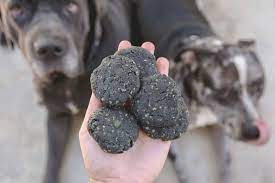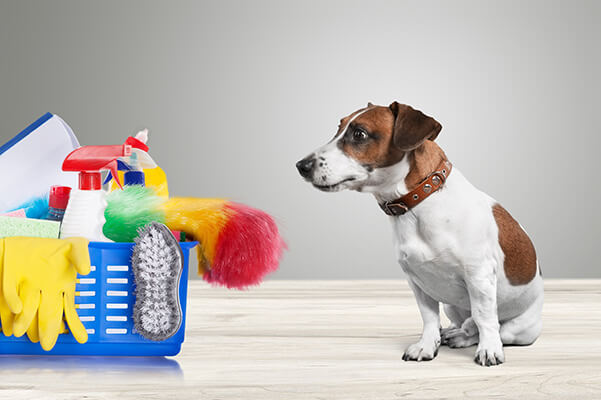Dogs are curious creatures, and as pet owners, we understand they tend to get into things that can cause serious harm. From common household cleaning supplies to more toxic materials like mouse or rat poison, these harmful items seem to find their way into our dog’s body, and we need to know what’s best to aid our pups when there’s ingestion of a toxin. Luckily, if your dog finds a toxic chemical or poison, there is a way to save your pet’s life if you act quickly using activated charcoal tablets or one of the many different forms. We’ll cover the benefits of activated charcoal, the most common side effect of using it, and how it activates within the digestive tract and protects your furry friend by preventing toxic poisoning through your dog’s bloodstream.
Activated Charcoal For Toxins Key Takeaways
Activated charcoal is commonly used as an emergency treatment for toxin ingestion in dogs.
It binds to toxins in a dog’s stomach and gastrointestinal tract, preventing absorption into the bloodstream.
Administering activated charcoal should always be done under the guidance of a veterinarian.
Immediate veterinary care should be sought if toxin ingestion is suspected.
What Is Activated Charcoal?

Activated charcoal is a substance that is made by burning wood or sometimes coconut shells at high temperatures and then treated with oxygen to increase its surface area. It is commonly used as an emergency treatment for toxin ingestion in dogs as well as a health supplement for human use to help alleviate gas and lower cholesterol, and it’s even believed to whiten teeth or cure hangovers.
How Pet Activated Charcoal Works For Toxins Consumed By Dogs?

When administered orally, activated charcoal binds to toxins in a dog’s stomach and gastrointestinal tract, preventing them from being absorbed into the bloodstream. This makes it a safe treatment option for pets in cases of accidental ingestion of harmful substances and the best way to counter symptoms of poisoning. Administering activated charcoal should always be done under the guidance of a vet, as the dosage and timing are crucial for its effectiveness.
If your dog has ingested a toxic substance, administering activated charcoal can be an effective solution. Activated charcoal products are commonly used in veterinary medicine to treat cases of poisoning. By giving your dog activated charcoal, you are essentially trapping the toxins in their stomach and preventing them from entering their bloodstream. The charcoal works by absorbing the toxins, meaning it binds to them and prevents their absorption. It’s important to consult with your veterinarian before administering activated charcoal, as the type of toxin and timing of ingestion can affect its effectiveness. Additionally, it is worth noting that adverse reactions to charcoal administration are rare, but it is always best to consult with a professional to ensure the health and safety of your furry companion.
What Does Activated Charcoal Look Like?
Activated charcoal is available in various forms, but the most common one is an oral solution. It is typically purchased as a bottle of black liquid or made by mixing powder with water in a veterinary clinic. This black liquid or powder has a distinct appearance, which helps in identifying it. When administering activated charcoal to your dog, it can be given orally by syringe or mixed with a small amount of food.
What Pet Poison Should Activated Charcoal Be Used For In Your Dog?
Activated charcoal can be used to absorb many types of poisons or toxins that a dog may ingest, including some types of drugs, pesticides, chemicals, poisonous plants, etc. It works by binding to the toxin in the gastrointestinal tract and preventing absorption into the bloodstream. It is most effective if given within 1 to 2 hours of ingestion of the toxin. The sooner it is given, the better it can prevent absorption.
Some common situations where activated charcoal is used in dogs include ingestion of chocolate, raisins, macadamia nuts, and xylitol. These contain toxins that can be life-threatening to dogs as well as certain types of pesticides or chemicals, like antifreeze or rodenticides. Activated charcoal should NOT be given if the dog has ingested strong acids or alkali substances, as it could make the damage worse. It’s best to consult your veterinarian before administering activated charcoal at home, as the proper dose depends on the size of the dog and type of toxin. They can advise you on whether it’s recommended in your particular situation.

Activated Charcoal’s Most Common Side Effects In Pets
While activated charcoal is commonly used as a safe treatment for toxin ingestion in dogs, it’s important to be aware of the potential side effects that can occur, and it’s always best practice to consult with a veterinarian to ensure proper dosage and administration. Vomiting and diarrhea are pets’ most frequently reported side effects of activated charcoal. However, other side effects such as constipation, gastrointestinal obstruction, black feces, hypernatremia, aspiration, and eye irritation may also occur. To minimize the risk of these side effects, following the veterinarian’s instructions and monitoring your pet closely during and after the oral medication of activated charcoal is essential.
Potential Reactions With Other Drugs And Medications When Giving Activated Charcoal
To avoid any potential interactions, it’s important to inform your veterinarian about any other drugs or medications your dog may be taking before administering activated charcoal. Activated charcoal can interact with oral medications, which may reduce their effectiveness. Your veterinarian needs to be aware of any recent oral medication your dog has taken in the past 24 hours. They may recommend altering the dosing of the medication when giving activated charcoal as a treatment option for toxin ingestion. By knowing about the other drugs and medications your dog is taking, your veterinarian can ensure the safety and effectiveness of the activated charcoal treatment. Communicating openly with your veterinarian is crucial to prevent any potential reactions between activated charcoal and other drugs or medications.
Recommended Dosage To Give Activated Charcoal To Dogs
Before administering activated charcoal to your dog, following the recommended dosage guidelines is important. The dosage of activated charcoal is based on your dog’s weight and may vary depending on the specific product you are using. Giving the correct dosage is necessary to ensure the safe and effective treatment of toxin ingestion in dogs. It’s recommended to consult a veterinary professional or poison control before administering activated charcoal to your dog, as they can provide guidance on the appropriate dosage for your specific situation. Incorrect administration of activated charcoal, especially when combined with cathartic agents, can lead to dehydration and other electrolyte imbalances. In some cases, multiple dosages of activated charcoal may be required to effectively remove toxins from the body. Always prioritize the safety and well-being of your dog by following the recommended dosage guidelines when giving activated charcoal.
The Cost Of Purchasing Activated Charcoal For Dogs
When purchasing activated charcoal for your dog, you can expect to spend around $20 to $30 per bottle. Activated charcoal is a commonly used and safe treatment option for toxin ingestion in dogs. The cost of purchasing activated charcoal can vary depending on your dog’s size and the toxin ingestion’s severity. Large dogs or more severe cases may require multiple bottles, which can increase the cost. Additionally, it is important to consider any vet-prescribed medications that may be needed to manage side effects, as this can also contribute to the overall cost of treatment.
Best Storage Tips For Activated Charcoal
Make sure to store your activated charcoal in a cool, dry place to maintain its effectiveness. Proper storage is important to ensure that the activated charcoal remains potent and ready for use in case of emergencies. Activated charcoal should be kept away from light, heat, and moisture, as these factors can degrade its quality. Following the manufacturer’s instructions for storage is essential, as some activated charcoal products may have specific requirements. By storing it correctly, you can ensure that the activated charcoal is readily available when needed to administer to your dog in case of toxin ingestion. If you have any doubts or questions about the storage of activated charcoal, you can consult the pet poison helpline or refer to the contextually relevant article section on activated charcoal administration.
Activated Charcoal For Toxins Frequently Asked Questions
Can Activated Charcoal Be Used For Other Pets Besides Dogs?
Yes, activated charcoal can be used for other pets besides dogs. It is commonly used to treat poisoning in cats and can also be given to other animals under the guidance of a veterinarian.
Is Activated Charcoal Safe For Puppies And Senior Dogs?
Yes, activated charcoal is generally safe for puppies and senior dogs. It can help absorb toxins in their digestive system. However, consulting with a veterinarian before administering any treatment is important.
How Quickly Does Activated Charcoal Work In A Dog’s System?
Activated charcoal can work quickly in a dog’s system, helping to absorb toxins and prevent them from being absorbed into the bloodstream. It’s important to consult with a veterinarian before administering any treatment.
Can Activated Charcoal Be Used As A Preventative Measure For Toxin Ingestion?
Activated charcoal should not be used as a preventative measure for toxin ingestion in dogs. It should only be used in an emergency situation for toxin absorption.
Are There Any Long-Term Effects Of Using Activated Charcoal in Dogs?
There are no long-term effects of using activated charcoal in dogs, but it should not be used on a regular basis. It can be safely given to your dog to help with a severe case of toxin ingestion and should not be a regular supplement. Make sure to consult your vet for proper dosage.
The Tail End
Activated charcoal can be useful in treating certain types of toxin ingestion in dogs. Using the recommended dosage and being aware of potential side effects and interactions with other medications is important. Additionally, proper storage of activated charcoal is essential for maintaining its effectiveness and avoiding adverse effects. Overall, consulting with a veterinarian is advised to determine if activated charcoal is appropriate for your dog’s specific situation.




